Содержание
- 2. THE PRESENT SIMPLE Утвердительная форма I work I work every day He She works He works
- 3. THE PRESENT SIMPLE Отрицательная форма I do not (don’t) work every day He She does not
- 4. THE PRESENT SIMPLE Вопросительная форма Do I work every day? Does he / she / it
- 5. THE PRESENT SIMPLE Глагол to be в утвердительной форме I am I am (I’m) busy every
- 6. THE PRESENT SIMPLE Глагол to be в отрицательной форме I am not I am not (I’m
- 7. THE PRESENT SIMPLE Глагол to be в вопросительной форме Am I busy today? Is he /
- 8. THE PRESENT SIMPLE Случаи употребления Для регулярно повторяющихся действий (сопровождаются обстоятельствами времени often, always, usually, sometimes,
- 9. THE PRESENT SIMPLE Для общеизвестных фактов, объективных процессов в природе: The sun sets in the west.
- 10. THE PRESENT SIMPLE Для действий, протекающих в течение длительного периода времени (постоянные действия, привычки): She works
- 11. THE PRESENT SIMPLE Для будущих действий в придаточных предложениях времени и условия после союзов when, after,
- 12. THE PRESENT SIMPLE Для запланированных событий согласно расписанию, графику: The flight leaves at 2 p.m. (according
- 13. THE PRESENT SIMPLE Для действий, выраженных глаголами состояния: Do you recognize me? I prefer dogs to
- 14. THE PRESENT SIMPLE Для спортивных комментариев, инструкций: Malkin serves to Crosby. Now I peel the apples,
- 15. THE PRESENT SIMPLE NOTA BENE The Present Simple употребляется в выражениях Here comes …, There goes
- 16. THE PRESENT SIMPLE NOTA BENE The Present Simple часто употребляется вместо the Past Simple и the
- 17. THE PRESENT CONTINUOUS Утвердительная форма I am He is She is It is + working We
- 18. THE PRESENT CONTINUOUS I am working in the garden He / She is working in the
- 19. THE PRESENT CONTINUOUS Отрицательная форма I am not She is not He is not It is
- 20. THE PRESENT CONTINUOUS Вопросительная форма Am I Is he Is she Is it + working ?
- 21. THE PRESENT CONTINUOUS Cлучаи употребления Для действий, происходящих в момент речи или в настоящий период времени
- 22. THE PRESENT CONTINUOUS Для выражения изменяющегося либо развивающегося действия или ситуации: The population is rising very
- 23. THE PRESENT CONTINUOUS Для обозначения временного действия: Now she is living in Minsk. I am walking
- 24. THE PRESENT CONTINUOUS Для обозначения часто повторяющегося действия, которое вызывает раздражение, недовольство (с наречиями always, constantly,
- 25. THE PRESENT CONTINUOUS Для выражения планов на ближайшее будущее: I am meeting my aunt at the
- 26. THE PRESENT CONTINUOUS Для настоящих действий, которые протекают параллельно друг другу. Два параллельных действия связываются при
- 27. NOTA BENE State The flowers smell nice. The parcel weighs 10 kg. She has a dog.
- 28. THE PRESENT PERFECT Утвердительная форма Утвердительная форма
- 29. THE PRESENT PERFECT Отрицательная форма
- 30. THE PRESENT PERFECT Вопросительная форма Have I Has he Has she Has it + worked Have
- 31. THE PRESENT PERFECT Случаи употребления Для действий, завершившихся до какого-то момента в настоящем. Виден результат действия.
- 32. THE PRESENT PERFECT They have just come back. Has your brother left school yet? I have
- 33. THE PRESENT PERFECT Для действий, начавшихся в прошлом и продолжающихся до сих пор. Обстоятельства времени, являющиеся
- 34. THE PRESENT PERFECT В конструкциях It is the first (second / last) time + the Present
- 35. THE PRESENT PERFECT for (=period of time) How long..? I have lived here for 20 years.
- 36. THE PRESENT PERFECT CONTINUOUS Утвердительная форма I We You have been working They He She has
- 37. THE PRESENT PERFECT CONTINUOUS Отрицательная форма I We You have not been working They He She
- 38. THE PRESENT PERFECT CONTINUOUS Вопросительная форма Have I Has he Has she Has it + been
- 39. THE PRESENT PERFECT CONTINUOUS Случаи употребления Для действий, начавшихся в прошлом, и длящихся до сих пор.
- 40. THE PRESENT PERFECT CONTINUOUS Для действий, которые длились до настоящего момента, закончились, но имеется видимый результат
- 41. NOTA BENE I have been learning irregular verbs all day long. (учила) I have been painting
- 42. THE PAST SIMPLE Утвердительная форма I He She It + worked / knew We You They
- 43. THE PAST SIMPLE Отрицательная форма I He She It + did not (didn’t) work We You
- 44. THE PAST SIMPLE Вопросительная форма I he she Did it + work? we you they
- 45. THE PAST SIMPLE Случаи употребления Для действий, которые произошли в некоторый момент времени в прошлом (время
- 46. THE PAST SIMPLE Для обозначения последовательных действий в прошлом: I got up at 7 o’clock, washed
- 47. THE PAST SIMPLE Для действий, которые регулярно совершались в прошлом, но больше не совершаются в настоящем,
- 49. THE PAST CONTINUOUS Утвердительная форма I was He was She was It was + working We
- 50. THE PAST CONTINUOUS I was working in the garden He / She was working in the
- 51. THE PAST CONTINUOUS Отрицательная форма I was He was She was It was + not working
- 52. THE PAST CONTINUOUS Вопросительная форма Was I Was he Was she Was it + working …?
- 53. THE PAST CONTINUOUS Случаи употребления Для действий, длившихся в определённое время в прошлом. Обстоятельства времени: at
- 54. THE PAST CONTINUOUS Для ситуаций, в которых одно действие произошло в ходе развития или на фоне
- 55. THE PAST CONTINUOUS Для прошлых действий, которые происходили параллельно друг другу. Два параллельных действия связываются при
- 56. THE PAST PERFECT Утвердительная форма I He She It + had worked We had known You
- 57. THE PAST PERFECT Отрицательная форма He She It + had not worked We + had not
- 58. THE PAST PERFECT Вопросительная форма I he she + worked? Had it + known? we you
- 59. THE PAST PERFECT Случаи употребления Для действий, завершившихся до определённого момента в прошлом. Обстоятельства времени: by
- 60. THE PAST PERFECT В конструкциях hardly … when, no sooner … than: Hardly had I entered
- 61. THE PAST PERFECT CONTINUOUS Утвердительная форма I He She It + had been working We You
- 62. THE PAST PERFECT CONTINUOUS Отрицательная форма I He She It + had not been working We
- 63. THE PAST PERFECT CONTINUOUS Вопросительная форма I he she Had it + been working …? we
- 64. THE PAST PERFECT CONTINUOUS Случаи употребления Для действий, начавшихся до определённого момента в прошлом и длящихся
- 65. THE FUTURE SIMPLE Утвердительная форма I he she it + will work we you they
- 66. THE FUTURE SIMPLE Отрицательная форма I he she it + will not (won’t) work we you
- 67. THE FUTURE SIMPLE Вопросительная форма I he she Will it + work …? we you they
- 68. THE FUTURE SIMPLE Случаи употребления Для действий, которые произойдут в какой-то момент времени в будущем. Обстоятельства
- 69. THE FUTURE SIMPLE Для обозначения неизбежного действия в будущем, на которое нельзя повлиять: I will be
- 70. THE FUTURE SIMPLE Для действий, решение о выполнении которых принято в момент речи: This bag is
- 71. THE FUTURE SIMPLE В сочетании с выражениями предположения, сомнения, вероятности после think, expect, believe, be sure,
- 72. THE FUTURE CONTINUOUS Утвердительная форма I he she it + will be working we you they
- 73. THE FUTURE CONTINUOUS Отрицательная форма I he she it + will not be working we you
- 74. THE FUTURE CONTINUOUS Вопросительная форма I he she Will it + be working …? we you
- 75. THE FUTURE CONTINUOUS Случаи употребления Для действий, которые будут происходить в точное время в будущем. Обстоятельства
- 76. THE FUTURE CONTINUOUS В вопросах о планах собеседника, если спрашивающий хочет, чтобы отвечающий что-то для него
- 77. THE FUTURE CONTINUOUS Для предполагаемых действий в будущем (которые запланированы): This time next week I will
- 78. THE FUTURE PERFECT Утвердительная форма I he she it + will have worked we you they
- 79. THE FUTURE PERFECT Отрицательная форма I he she it + will not have worked we you
- 80. THE FUTURE PERFECT Вопросительная форма I he she Will it + have worked …? we you
- 81. THE FUTURE PERFECT Случаи употребления Для действий, которые завершатся до определённого момента времени в будущем. Обстоятельства
- 82. THE FUTURE PERFECT CONTINUOUS Утвердительная форма I he she it + will have been working we
- 83. THE FUTURE PERFECT CONTINUOUS Отрицательная форма I he she it + will not have been working
- 84. THE FUTURE PERFECT CONTINUOUS Вопросительная форма I he she Will it + have been working …?
- 85. THE FUTURE PERFECT CONTINUOUS Случаи употребления Для действий, которые будут длиться какое-то время до определённого момента
- 86. Put in the verbs in brackets in the Past Simple Last summer Jane and Pete (visit)
- 87. Put in the verbs in brackets in the Past Simple Last summer Jane and Pete visited
- 88. Раскройте скобки, употребив правильную форму глагола. Julia ____________ (be) my best friend, but we are not
- 89. Ann _____________ (eat) at home, but now she eats out. I _____________ (not/like) meat, but now
- 90. Open the brackets. Use the Present Continuous or Present Indefinite. Use the Present Simple or the
- 91. Open the brackets. Use either the Past Continuous or Past Indefinite. Sally (to burn) her wrist
- 93. Скачать презентацию



















































































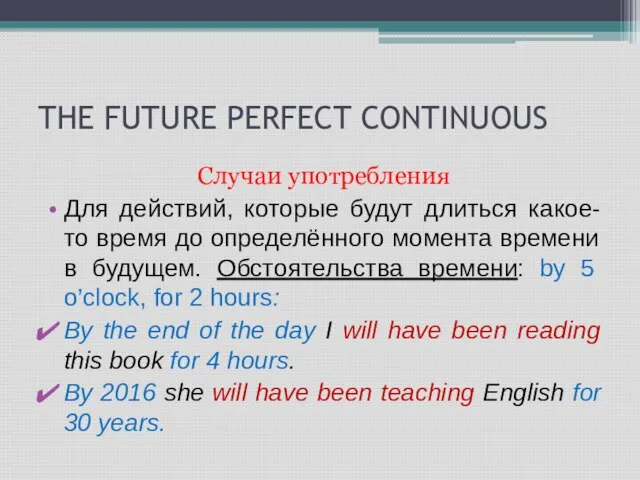

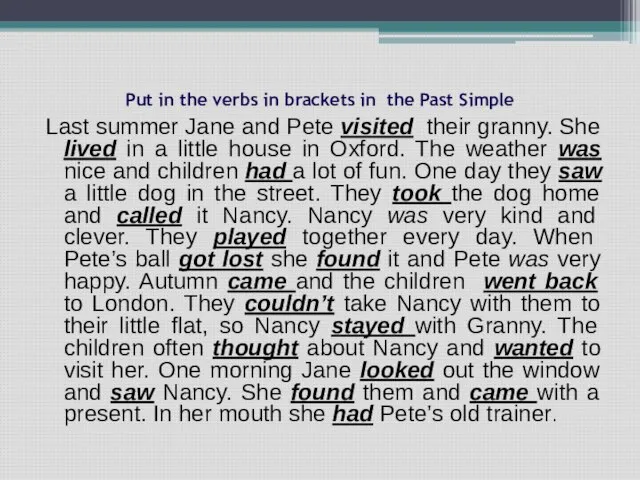
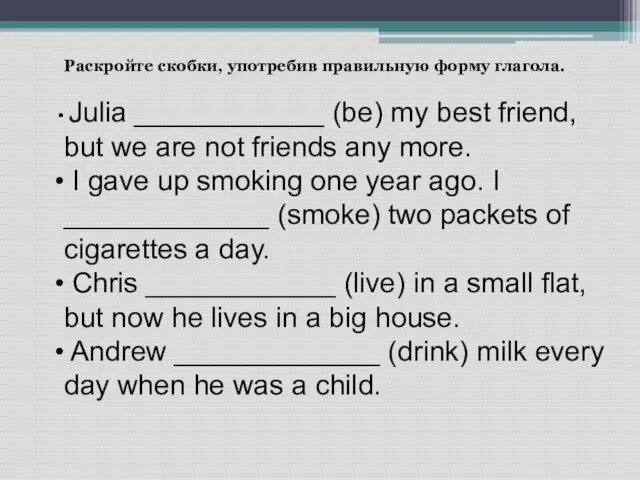
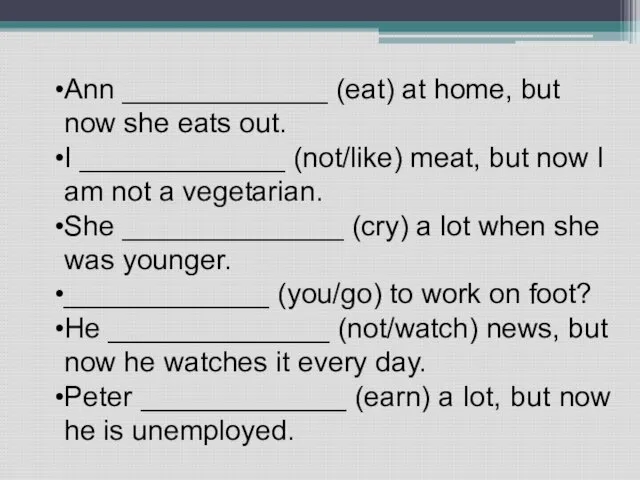
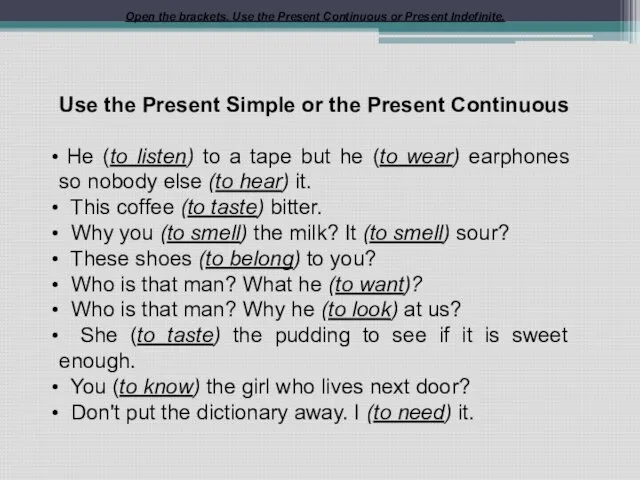
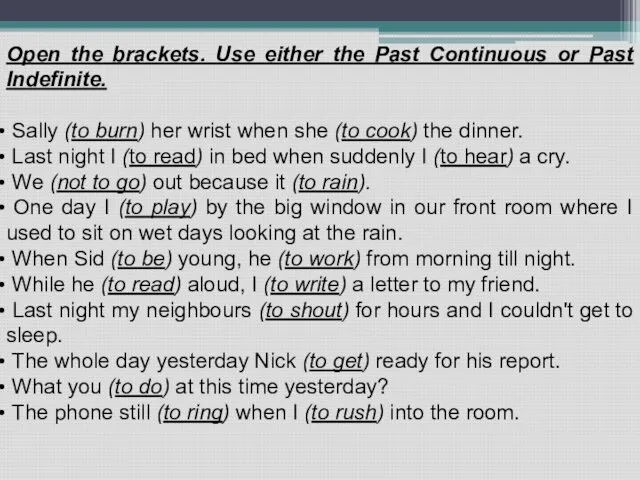
 Открытие транспортных услуг Cab-IN
Открытие транспортных услуг Cab-IN Prezentatsia_Kornaeva
Prezentatsia_Kornaeva Чемы мы можем научится подгядывая за животными и растениями?
Чемы мы можем научится подгядывая за животными и растениями? Эссе 11 класс.pptx
Эссе 11 класс.pptx Готовность к школе
Готовность к школе DAnil_SAShA
DAnil_SAShA Les jeux olympiques
Les jeux olympiques Кадровый документооборот. Номенклатура дел. Сроки хранения бухгалтерских документов
Кадровый документооборот. Номенклатура дел. Сроки хранения бухгалтерских документов Презентация на тему Аппликация из геометрических фигур
Презентация на тему Аппликация из геометрических фигур Первый шаг в избирательное право
Первый шаг в избирательное право Фамилии Прилузского района
Фамилии Прилузского района ТУРНИРРЕПУТАЦИЯ УКРАИНЫ 2020
ТУРНИРРЕПУТАЦИЯ УКРАИНЫ 2020 Ethics of Translation
Ethics of Translation Праздники и обряды на Руси
Праздники и обряды на Руси Синхронное плавание.Климашевской Елизаветы
Синхронное плавание.Климашевской Елизаветы История о том, как заставили работать химическую реакцию
История о том, как заставили работать химическую реакцию Социально-гуманитарный факультет. Итоги НИР за 2016 год
Социально-гуманитарный факультет. Итоги НИР за 2016 год А ты не забыл сменную обувь?
А ты не забыл сменную обувь? Аэропорт базирования – ICN
Аэропорт базирования – ICN Презентация на тему Творческий проект по технологии
Презентация на тему Творческий проект по технологии Презентация на тему Сирийская Арабская Республика
Презентация на тему Сирийская Арабская Республика Презентация на тему Народная танцевальная культура
Презентация на тему Народная танцевальная культура Организационная культура и деловой этикет
Организационная культура и деловой этикет Презентация на тему Свобода и ответственность (4 класс)
Презентация на тему Свобода и ответственность (4 класс) Зерновые культуры (3 класс)
Зерновые культуры (3 класс) Презентация на тему Взрывы Урок ОБЖ 8 - класс
Презентация на тему Взрывы Урок ОБЖ 8 - класс  Вода и её роль в природе.
Вода и её роль в природе. 10 кл Урок 3
10 кл Урок 3